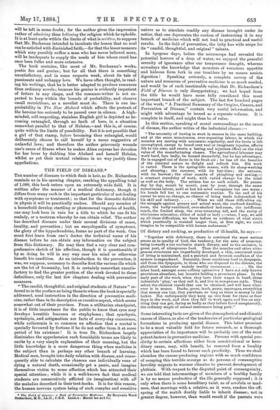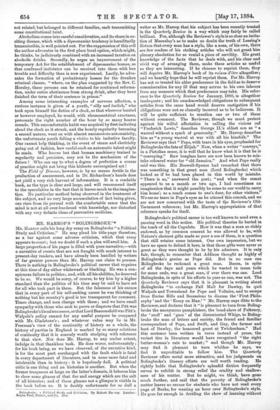THE FIELD OF DISEASE.* THE number of diseases to which
flesh is heir, as Dr. Richardson reminds us in his opening chapter, reaching the appalling total of 1,088, this book enters upon an extremely wide field. It is written after the manner of a medical dictionary, though it differs from many such in the important particular of not dealing with symptoms or treatment ; so that for the domestic dabbler in physic it will be practically useless. Should any member of -a household develop startling or phenomenal vagaries of health, one may look here in vain for a title to which he can fit his malady, or a nostrum whereby he can obtain relief. The author has described diseases under their several divisions of cause, locality, and prevention ; but an encyclopaadia of symptoms, the glory of the hypochondriac, forms no part of the work. One must first learn from one's doctor the technical name of his disease before he can obtain any information on the subject from this dictionary. He may then find a very clear and corn- prehensive sketch of his affection, though it is questionable if by so doing he will in any way ease his mind or otherwise benefit his condition. As an introduction to the prevention, it was, we suppose, necessary to describe first the various ills which are the lot of humanity, but it is certainly somewhat unsatis- factory to find the greater portion of the work devoted to these definitious, only the last few chapters dealing with preventive measures.
"The candid, thoughtful, and original students of Nature" re- ferred to in the preface as being those to whom the book is specially addressed, need instruction in the direction of preventive medi- cine, rather than in its descriptive or curative aspect, which seems somewhat out of their province. From a utilitarian standpoint, it is of little importance for the public to know that eyes may develope keratitis lencoma or staphyloma ; that synchysis, nyctalopia, and astigmatism are facts of every-day occurrence, while asthenopia is so common an affection that a mortal is specially favoured by fortune if he do not suffer from it at some period of his existence ! It is true Dr. Richardson largely diminishes the apprehension such formidable terms are likely to excite by a very simple explanation of their meaning, but the little knowledge is a more dangerous thing when medicine is the subject than in perhaps any other branch of learning. Medical men, brought into daily relation with disease, and conse- quently able to calculate the chances one individually runs of .dying a natural death, occasionally get a panic, and imagine themselves victim to some affection which has attracted their special attention ; while it is a well-known fact that medical students are consecutively afflicted (in imagination) with all the maladies described in their text-books. It is for this reason, the human nervous system being of such complex and sensitive
The Field of Disease: a Book of Freventice Medicine. By Benjimin Ward Richardson, M.D., LL.D., F.R.S. Londun : Macmi Ian and Co.
nature as to simulate readily any disease brought under its notice, that one deprecates the custom of instructing it in any branch of medicine which will not lead to practical and useful results. In the field of prevention, the laity has wide scope for its "candid, thoughtful, and original" talents.
In byegone days, before the microscope had revealed the potential horrors of a drop of water, we enjoyed the peaceful serenity of ignorance after our temperance draught, whereas nowadays the knowledge that monsters of voracious appetite and hideous form lurk in our tumblers by no means assists digestion ! Speaking seriously, a complete survey of the nature and resources of preventive medicine is so much needed, and would be of such inestimable value, that Dr. Richardson's Field of Disease is only disappointing; we had hoped from the title he would have more fully considered this most important branch of the subject. The last few hundred pages of the work, "A Practical Summary of the Origins. Causes, and Prevention of Disease," contain very useful information, and might with advantage be issued as a separate volume. It is complete in itself, and might thus be of value.
In this section, speaking of moral surroundings as the cause of disease, the author writes of the industrial classes :—
"The necessity of having to work in masses in the name building, and at the same monotonous, ever-repeating labour, in which the muscles are moving with automatic regularity, and the brain is left unemployed, except to brood over real or imaginary injuries, affects life to the core, and exerts a lasting and injurious effect on the vital value of the manufacturing classes. The agricultural labourer may work hard, fare badly, be housed shamefully, but he has advantages. He is engaged out of doors in the fresh air ; he has all the beauties of the external nature to delight and refresh him. Ma work is varied. There is the spring-tide season, with its sheep-washing and shearing; the summer, with its hay-time; the autumn, with its harvest ; the other months of ploughing and sea ing,— a constant roundelay of work, with varied change for the mind as well as the body. The artisan has no such reliefs. He passes day by day, month by month, year by year, through the same monotonous labour, until at last his mind recognises but one scene ; his hands fall but to one automatic routine. To the end of his career he sees no change, no chance of being made independent by
his skill and industry When we add these difficulties up, the struggle against penury and actual want, the confined dwelling- room, the badly-ventilated, over-stocked bed-room, the indifferent couch, the limited sleep, the ever-returning toil, and the rarity of who:eaome relaxation, either of mind or body ;—when, I say, we add up all these difficulties, we have. before us evidence of vital strain which practically is resisted longer than, at first sight, we could imagine to be compatible with human endurance."
Of dietary and cooking, as productive of ill-health, he says :—
"Together with deficiency, the,re is combined the most serious errors as to quality of food, the tendency, for the sake of economy, being towards a too exclusive starch dietary, and to the omission, in great part, of nitrogenous food. Thus the muscles and other nitro- genous structures are imperfectly developed, a thin, emaciated state of living is maintained, and a parched and feverish condition of the system is engendered. Naturally, these conditions lead to dyspepsia, and from the dyspepsia, in those who are disposed to the disease, the phthisical tubercular malady readily commences On the other hand, amongst some colliery operatives I have not only known provisions abundant, but luxuries holding a prominent place. In the early part of the week, when they have their wages in hand, these industrials play,' as they call it, and live in sumptuous style. They select the choicest viands that can be obtained, and will have what- ever is in season. Ducks, geese, lamb, game, asparagus, everything that money can buy, they purchase, so long as there is money in the locker. Not unfrequently they keep up this feast for three or fear days in the week, and then they fall to work again and live on any- thing they can get, faring as badly as they before fared sumptuously, the ordinary staple of animal sustenance being pork."
Some interesting facts are given of the atmospherical and climatic causes of illness, as also of the tendencies of particular geological formations in producing special disease. This latter promises to be a most valuable field for future research, as a 'thorough appreciation of its importance will be probably one of the most potent factors in preventive medicine. Persons with special pro- clivity to certain affections either from constitutional or here- ditary cause, may, with benefit, be removed from a locality which has been found to favour such proclivity. Thus we shall abandon the cancer-producing regions with as mach confidence of escaping this terrible scourge as do persons of consumptive heredity migrate to warmer climates to prevent development of phthisis. With respect to the disputed point of consanguinity, we are told that intermarriage of members of a healthy family is by no means productive of the ills generally supposed ; it is only when there is some hereditary taint, as of scrofula or mad- ness, that marriage with a relative, as it were, renders the off- spring of the match doubly liable to inherit disease ; not in greater degree, however, than would result if the parents were not related, but belonged to different families, each transmitting some constitutional taint.
Alcoholism comes into careful consideration, and its share in ex- citing disease, which with a dipsomaniac tendency is hereditarily transmissible, is well pointed out. For the suppression of this evil the author advocates in the first place local option, which might, he thinks, be judiciously combined with an increased taxation on alcoholic drinks. Secondly, he urges an improvement of the temporary Act for the establishment of dipsomaniac homes, so that confirmed inebriates can be received into them with less trouble and difficulty than is now experienced. Lastly, he advo- cates the formation of probationary homes for the drunken criminal classes, "where, on the plan suggested by the Rev. C. Horsley, these persons can be retained for continued reforma- tion, under entire abstinence from strong drink, after they have finished the term of their sentence in prison."
Among some interesting examples of nervous affection, a curious instance is given of a youth, "silly and foolish," who took upon himself the duties of a clock, so that wherever located or however employed, he would, with chronometrical exactness, personate the right number of the hour by so many hoarse sounds. This uncomfortable habit was acquired by first imitating aloud the clock as it struck, and the hourly regularity becoming a second nature, went on with almost unconscious automaticity, the unfortunate youth falling a victim to his imitative faculty. One cannot help thinking, in the event of steam and electricity going out of fashion, how useful such an automatic talent might be made. Who knows but that human machinery trained to regularity and precision, may not be the mechanism of the future! .Who can say to what a degree of perfection a course of practice might not bring this hitherto unrecognised art !
The Field of Disease, however, is by no means fertile in the production of amusement, and in Dr. Richardson's hands does not yield a very rich harvest of information. It is a readable book, as the type is clear and large, and will recommend itself to the speculative in the fact that it leaves much to the imagina- tion. No particular method being observed in the treatment of the subject, and no very large accumulation of fact being given, one rises from its perusal with the comfortable sense that the mind is not at all over-burdened with knowledge, nor disturbed with any very definite ideas of preventive medicine.



































 Previous page
Previous page